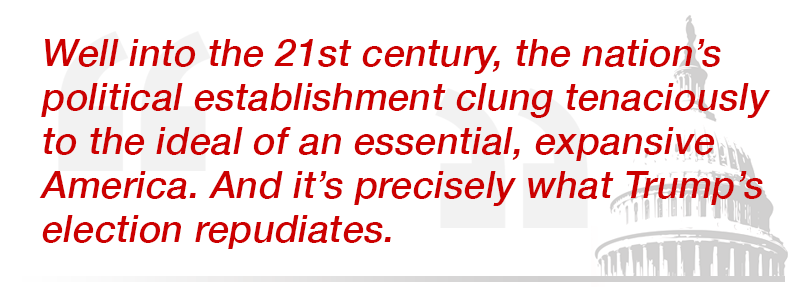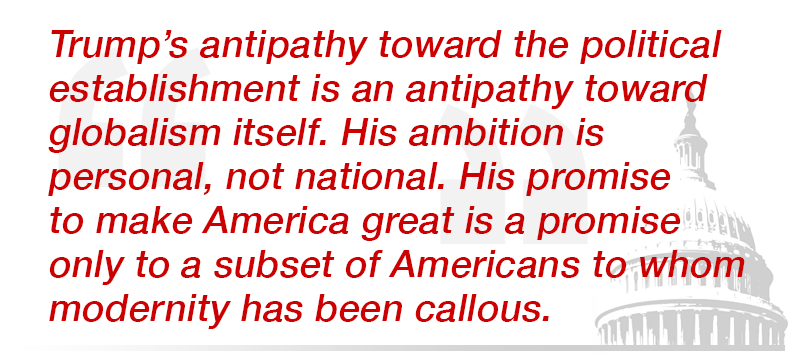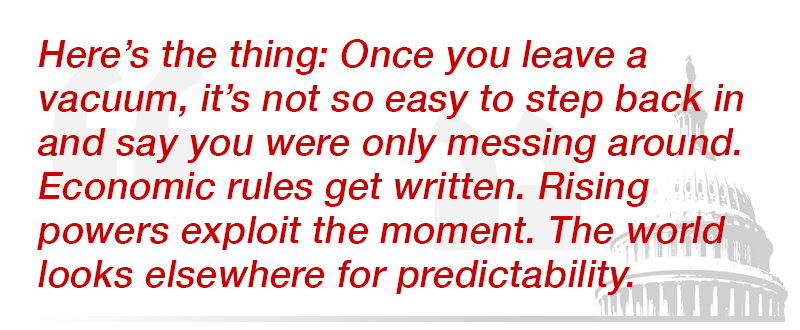President Trump and the end of the American Century

It’s inauguration week just as the Framers must have imagined it: citizenry streaming into the capital from every state to celebrate the most sober and symbolic moment in the democracy, even as the soon-to-be president tears into an American hero, fends off criticism from allies, deflects a sexual harassment suit and wails that his public approval ratings are rigged.
This is how the Trump presidency begins, and the American Century ends.
I don’t say this in a way that’s gloomy or hysterical; don’t count me among those who assume the nation is headed off a cliff. (Count me, instead, among those who think the odds of us doing all this again in three years or less are about 50-50.)
I’m only saying that political epochs, like the one into which every one of us was born, have demarcation points that can only be clearly seen in retrospect. And we’re living through one right now.
Any calendar will tell you, for instance, that the 19th century ended in 1901, the year President McKinley was assassinated and Teddy Roosevelt took his place. But most historians would argue that, for any practical purpose, the previous century of British dominance — Pax Britannica and all that — really saw the curtain fall in 1914, at the onset of the First World War.
The empire would hold together for another 30 years after that, give or take, but beginning with the campaign against Germany and its allies, the orchestra was playing Britain off center stage. The costs of planetary preeminence, already a burden in peace, were unsustainable in war.

The 20th century as we think of it probably began about 30 years later, after Franklin Roosevelt solidified American dominance over the western half of a globe riven by ideology. From then on, Washington was at the epicenter of world events, the seat of unrivaled might among free nations.
America was the most expansive country in the world, but whereas Britain had chiefly expanded its physical domain, we expanded our standard of living at a staggering rate. We expanded our markets to much of the world, education to all reaches of the country and — at long last — civil rights to the citizenry.
We expanded the cultural reach of America — movies and sitcoms, soft drinks and sports teams, transcendent celebrity and defiant individualism — to every hamlet on earth where you could string an electrical wire.
But just as the British Empire strained to maintain its momentum in the decades leading up to World War I, so too did our vast expansion run up against the boundaries of time and technology.
Globalism, made possible by cheaper technologies and transportation, gave rise to competitors, even as automation made our own workers redundant. Factory towns cratered. The price of maintaining global hegemony, both in lives and in credit, became harder to justify.
Government continued to grow, but now so did the chasm between the rich and everyone else.
Still, well into the 21st century, the nation’s political establishment clung tenaciously to this ideal of an essential, expansive America. It was at the heart of George W. Bush’s calamitous adventure in Iraq and of his party’s bid to create a new federal program for prescription drugs. It was the vision behind Barack Obama’s health care plan, his pact with Iran and his failed effort to forge a new market in Asia.
And it’s precisely what Donald Trump’s election repudiates.
Trump has said all kinds of conflicting things about almost everything; I expect he’ll contradict himself a half dozen times on the Capitol steps alone. But in this one respect he has been faithful: He believes the time has come for withdrawal and isolation, rather than expansion and globalism.

Trump rejects free trade. He rejects our disproportionate role in the military defense of Europe and the West. He rejects the diversifying of our culture and the opening of our borders.
He embraces the kind of tariffs that were once thought the relic of an old international system. He would cede the shaping of markets to a Chinese leadership that now, improbably, seems to be the world’s largest cheerleader for trade. He imagines profound beauty in a wall.
Ronald Reagan, to whom Trump would like to compare himself, defied his critics by reaffirming our global ambition to enemies abroad. Trump launches his presidency by telling our allies we’ve had enough.
His antipathy toward the political establishment is an antipathy toward globalism itself. His ambition is personal, not national. His promise to make America great is a promise only to a subset of Americans to whom modernity has been callous.
It is a vision that resonates widely. In fact, it is the only aspect of Trump that does.
A poll by the Washington Post and ABC News this week found that Trump arrives in Washington with the lowest approval rating of any president-elect in 40 years — about half as much support as Obama had at the same time in 2009. Remarkably, though, Trump inspires enviable confidence when it comes to creating jobs and stopping terrorism.
Americans may not countenance a literal wall, but they see promise in the idea of hunkering down for a while, of trying to do a little less abroad and at home.
You can say this is only a momentary digression. You can imagine that Trump represents a kind of national catharsis, after which we will get ourselves together and continue on with the sober business of statecraft and global leadership.
But here’s the thing: Once you leave a vacuum, it’s not so easy to step back in and say you were only messing around. Economic rules get written. Rising powers exploit the moment. The world looks elsewhere for predictability.
This is what Vladimir Putin understands, by the way. This is why he loves Trumpism. Russians are nothing if not patient, and they’ve been waiting about 75 years for this moment.

Even as Trump prepares to place his hand on a Bible, the world is shucking its reverence for American democracy, aghast at our penchant for triviality. When I was in Australia last summer, when Trump was just a nominee, the comment I heard again and again from the political elite was some version of: What exactly do you people think you’re doing? Do you not get how much the world relies on your stability?
Yes, we get it. And apparently we’re tired of it. No offense, but we’re all expanded out over here.
Of course America can still be great in the decades ahead. (And yes, Mr. President-elect, it is.) We’re bound by demographics to become a more diverse, more enlightened country, not less so. We remain the world’s leading exporter of culture and consumerism. We’re awash in technological talent, and we command more military machinery than any nation in history.
But like the British before us, we’re increasingly reconciled to being one power among many — to act modestly on our own behalf, rather than grandly in the service of what Joe Biden, speaking at Davos this week, called the “liberal international world order.”
The vastness of America’s vision gives way now to the smallness of Trump’s appeal. The American Century recedes, 140 characters at a time.
Read more from Yahoo News:





